Layers of Learning’s Writer’s Workshop isn’t just a curriculum; it’s a mindset. It’s a lifestyle that will change writing from a chore to a joy as your whole family grows as writers together, family-school style.
To get you started on the right foot in this new mindset, we invite you to read the Writer’s Workshop Guidebook. It is written specifically for the parent or writing mentor. It will give you a clear picture of what Writer’s Workshop looks like and set you up for success.
After many, many years of teaching writing in this style, we share our best tips and an overall picture of what has worked well in our homeschools and co-ops, as well as provide detailed instructions for setting up a Writer’s Workshop and getting started with the units successfully.
Nine Genre Units In One Reusable Program
The Writer’s Workshop program is divided into units based on different genres of writing including poetry, fanciful stories, report & essays, and so on.
Writer’s Workshop is sold two ways: as individual PDF units and as a single volume that includes all nine of the units.
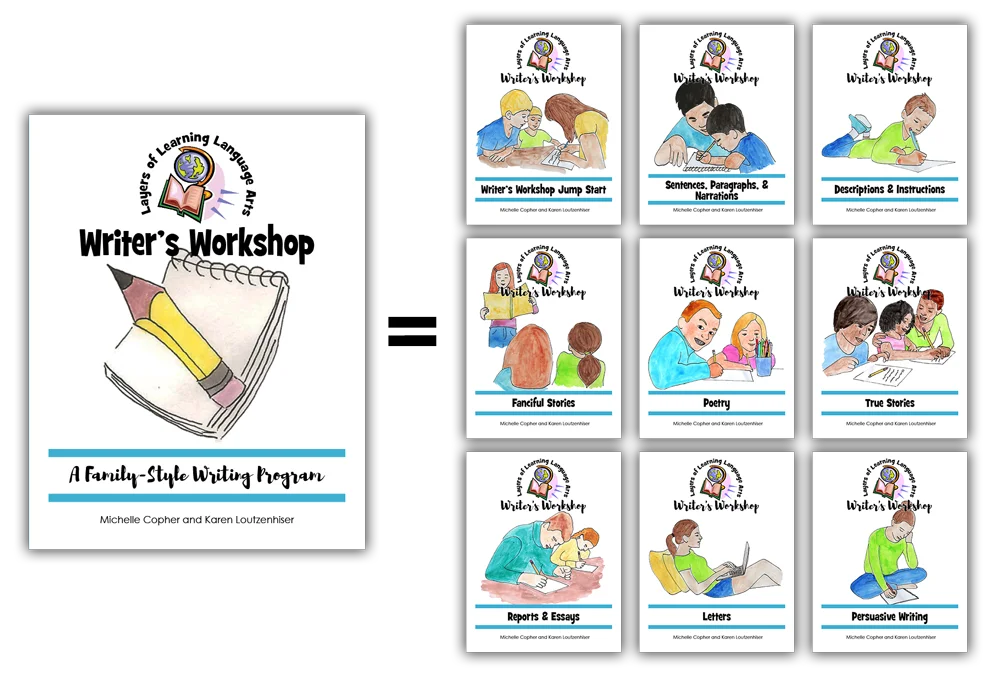
Each genre unit is intended to last for about a month in your homeschool. You will pick and choose the parts you want to do, then be able to reuse it in subsequent years by choosing other exercises and writing projects from the same genre. Each unit can be used again and again in your family.
You can buy the entire program in one volume. Choose between a digital PDF download or a printed paperback version –>
Or Buy the Units One by One
Each unit included in the Writer’s Workshop program can also be purchased individually as PDFs. Here is what is included:
Writer’s Workshop Jump Start
We recommend using this at the beginning of each school year. It’s full of short writing exercises that are meant to spur on ideas and get kids in a creative, thoughtful groove. It also teaches the writing process and helps writers get settled into their Writer’s Notebooks.
Sentences, Paragraphs, & Narrations
This unit will get writers off on the right foot to crafting strong sentences and organized paragraphs. All of the content in it can be directly applied to what you’re learning about in other school subjects, so if you’ve been hoping to create greater unity between writing instruction and history, geography, science, and art, this is a great place to start. Along with learning how to write narrations, kids will learn how to write for tests.
Descriptions & Instructions
In this unit, you’ll get into the meat of what makes writing powerfully captivating. By using exact language, strong verbs, and sprinkling in figurative language, young writers will be able to capture interest in new ways. In addition, they will practice writing with precision.
Fanciful Stories
Fairy tales, superhero stories, fables, tall tales, and every other imaginary story falls into this really fun unit. Besides learning the structure and elements of a story, writers will also focus on surprising the audience and weaving in a theme, all through the lens of fiction.
-
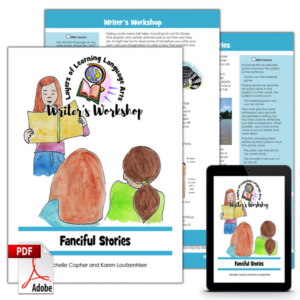 Fanciful Stories – PDF$5.99
Fanciful Stories – PDF$5.99
Poetry
Together, you will read and write poetry and play with words. Both formula poems and free verse will accompany your study of poetry terms, vivid language, and painting a picture with words.
-
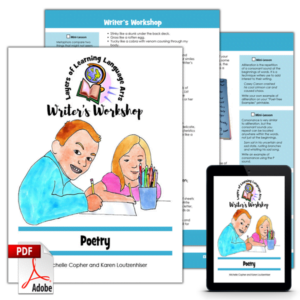 Poetry – PDF$5.99
Poetry – PDF$5.99
True Stories
The flipside to Fanciful Stories, in True Stories you’ll learn biographies, autobiographies, articles, and personal narratives, You’ll also create an All About Me book and learn to journal about your life more effectively.
-
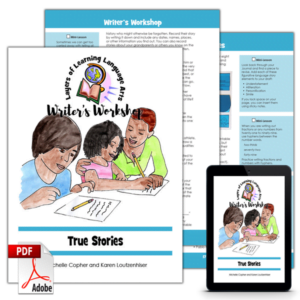 True Stories – PDF$5.99
True Stories – PDF$5.99
Reports & Essays
This unit will sharpen your skills as a serious writer. You will both research and share your own ideas as you learn to share the true things you know about. You’ll explore everything from animal reports to the ever-valuable five-paragraph essay and master what it takes to share true information in an organized way.
-
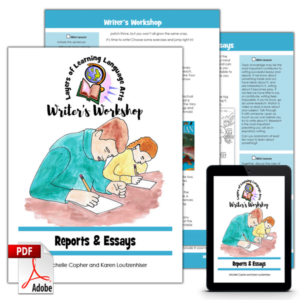 Reports & Essays – PDF$5.99
Reports & Essays – PDF$5.99
Letters
The Letter genre actually covers a lot more than just friendly letters. You’ll learn how to write and send e-mail, create a resume, fill out forms, and write a letter to the editor, among other valuable correspondence skills.
-
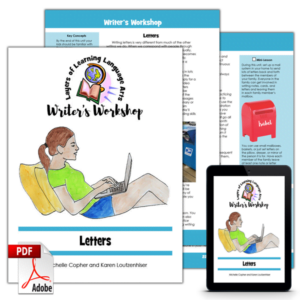 Letters – PDF$5.99
Letters – PDF$5.99
Persuasive Writing
The art of persuasion will be practiced through lots of forms in this unit, from convincing your parents to let you stay up late to writing a full-blown persuasive essay. You’ll learn the tricks to writing in a convincing, memorable way.
-
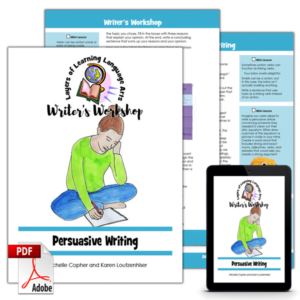 Persuasive Writing – PDF$5.99
Persuasive Writing – PDF$5.99
Research Paper
The Research Paper unit is the only one that is written specifically for teens. This step-by-step guide will teach teens how to write a full-blown research paper, one bit at a time.
Research Paper is sold only as a PDF and is not included in the single volume Writer’s Workshop.
-
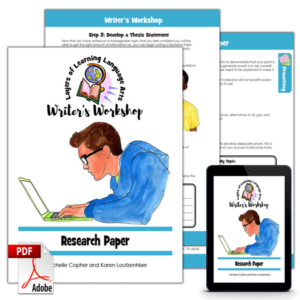 Research Paper – PDF$9.99
Research Paper – PDF$9.99
Inside Each Unit
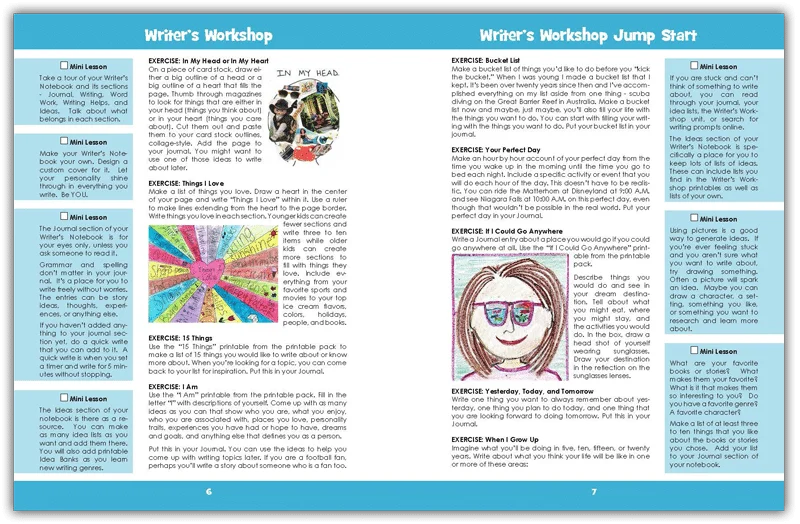
Exercises
Within each unit, you will find exercises – short writing assignments that help you develop specific writing skills. None of the exercises will be graded. They are practice. Most of these will be kept within a Journal that is personal to each writer. Creativity and freedom of expression are hallmarks of a successful Writer’s Workshop.
Mini-Lessons
Accompanying the exercises, there are sidebars within each unit that share mini-lessons, short daily lessons to help teach grammar, punctuation, the writing process, genre skills, and more. Mentors are also encouraged to be an active member of the Writer’s Workshop, noticing skills that need to be taught and tailoring the program to help growing writers. In addition, within the Layers of Learning catalog, you can click on the unit you are using and have access to more links, the unit’s YouTube playlist, and the continually-growing Writer’s Workshop Pinterest board.
Project Ideas Banks
During the course of each unit, one project will be chosen and the writer will take that one piece all of the way through the writing process – prewriting, drafting, revising, editing, and publishing. Every unit includes idea banks to spur on ideas and keep pens to paper. The monthly project will be the only graded writing, and its evaluation includes a rubric that addresses specific skills learned within the unit.
Printables
Every single Writer’s Workshop unit also includes a printable pack full of printables used within the exercises and mini-lessons, as well as printable idea banks and rubrics.
Word Work
Word Work is a spelling and vocabulary program for 6 years old to 18 years old. It is also a constant companion to all of the other units.
Word Work includes:
- spelling lists
- vocabulary lists
- spelling activity ideas
- worksheets to use with any spelling list
It is sold only as a digital PDF download.
You will begin each day with a short session of mastering words, including both spelling and vocabulary.
Word Work allows kids to master the words that will be their medium for sharing the ideas they have.
-
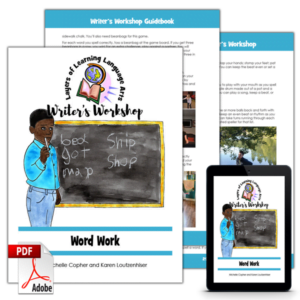 Word Work – PDF$5.99
Word Work – PDF$5.99
The Goal of Writer’s Workshop
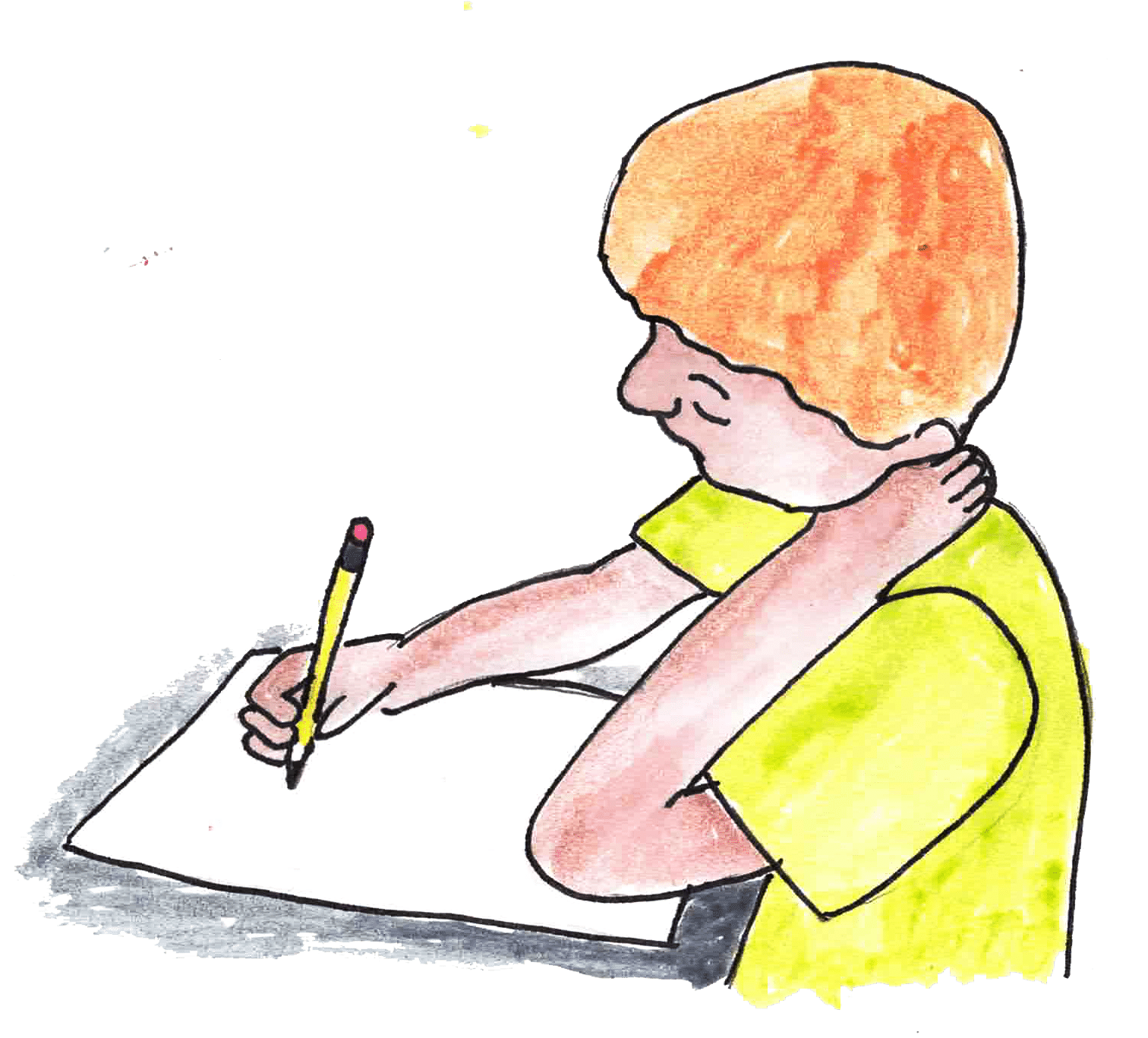
Writing in our homeschool happens in short bursts throughout our day. We use it to show what we know and add our own ideas and contributions to the world’s body of knowledge. Writing is empowering! Rather than getting caught up in mechanics and mundane exercises, we focus on ideas first. We use writing to communicate, to share a part of ourselves and our ideas.
Process Over Product
As we write, we focus on the process, not just the product. Writer’s Workshop Jump Start will help kids practice the writing process, which they will continue to use as they write.
- pre-writing
- drafting
- revising
- editing
- publishing
Just to be clear, these steps don’t all happen in a day, and sometimes they don’t all happen in a week. I teach mini-lessons just about every day. We write in our writer’s notebooks until we have something we want to turn into more. Sometimes this happens spontaneously (like my son’s series of Super Monkey books about a superhero monkey who saves the world from a variety of evil-doers). Sometimes it happens because I assign something; “Okay young authors, your biography is due on Friday. . . no more dawdling!”)
The kids write, wherever they are at in the process, until we are ready to move on to something else. Then they just put it away and pick up where they left off the next day.
Some Quick Tips
Open creativity is awesome, but we’re also believers in providing clear direction. There’s nothing worse than being told to write anything at all when no ideas seem to come. Some kids will come up with their own ideas, but you should also have assignments, story starters, fun ideas, and specific directions on hand for those writers who don’t come up with topics and ideas well on their own. The Writer’s Workshop units are a go-to source of inspiration for those tidbits of fun.
The physical act of writing can be quite a chore for some kids. Don’t take the burden away entirely, because the way they will build writing endurance is by writing. At the same time, you can lighten the burden. For example, taking a story all the way through the writing process can involve three or more re-writes. Have kids do it once, but then you can pitch in and type up the story. With little ones, you may even do some of their writing on the first draft to help them get their ideas down, but don’t ever take over and do all the writing if you want them to grow as writers.
Pre-writing is an important first step in the writing process. Talking about ideas, drawing a picture, creating a character sketch, or making a web or outline can make an overwhelming assignment manageable. A fun pre-writing activity is a great mini-lesson with each new genre you start
Every day is different and variety is key. Sometimes we’re quietly writing at desks. Sometimes we’re outside listing as many things as we can see in our yard together. You may find me typing up a story with a kid at my side as we talk about how to make the writing better. You may see us all sitting together writing a collective story, with Mom as the
We Hope You’ll Join Us!
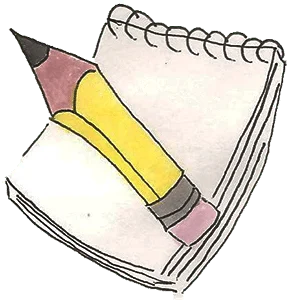
We write all throughout our day, whether we’re writing what we learned about an artist, explaining a math concept in a journal entry, writing up an experiment, or creating a passage in our world explorer journals. Our Writer’s Workshop gives us the flexibility to write about anything we have big ideas about. As we master the writing process and learn how to be better writers, we get to use those skills to better share the ideas we have. Through Writer’s Workshop, we grow! We hope you’ll join us in creating a Writer’s Workshop in your homeschool. We can’t wait to see the ways you grow too!
Writer’s Workshop in a Podcast
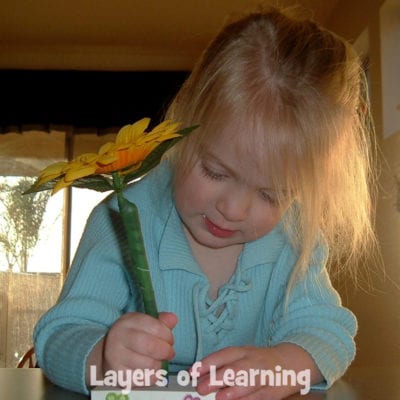
Want to hear Karen and Michelle chat about Writer’s Workshop? Listen in on their Writer’s Workshop podcast episode. Michelle picked Karen’s brain a bit about how Writer’s Workshop came about and what it looks like in her homeschool.

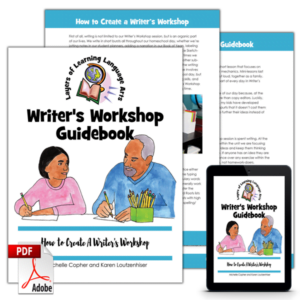
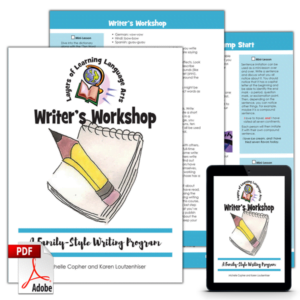
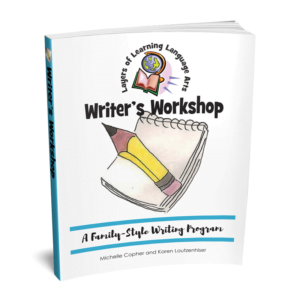
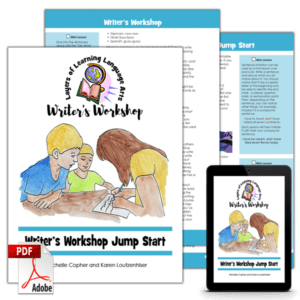
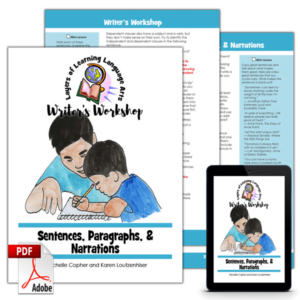
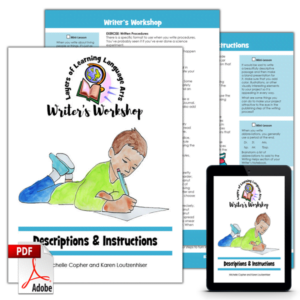
Excellent job Layers of Learning. These ideas will work wonderfully with my Deaf students. Writing is a major challenge for them but these strategies and fun activities are just what they need. Thanks.
Hi Michelle!
How can I get access to this guide?
You’ll find the complete Guidebook in the Writer’s Workshop section of the Layers of Learning catalog. https://layers-of-learning.com/shop/writers-workshop/digital-pdf/guidebook-how-to-create-a-writers-workshop/
is there a plan to put out curriculum guides for the other genres?
Yes! The other guides will be coming out over the next year.
My children have never had formal Grammer. Do you suggest a Grammer supplement for my oldest, a 6/7th grader? Something that starts from the beginning but will get her up to speed.
Maranda, You don’t necessarily have to do formal grammar. Writer’s Workshop style is to teach “mini lessons” which include grammar and writing skills. The mini lessons are tailored by you to what your children need to learn. There are sidebars with lesson ideas all through the Writer’s Workshop program. But if you are feeling unsure about grammar rules yourself and unable to spot where and how corrections need to be made in your children’s work, then we recommend purchasing a simple inexpensive grammar workbook and going through it as a family, not necessarily doing the whole workbook, but using it as the “mini lessons” until you all feel up to speed. Something like English & Grammar 6 would be appropriate for the whole family to work on together.
Hi, my son is in second grade and I’m looking for a writing program for him and this looks great! Do I also need a separate Language Arts curriculum? Also, is this all meant to be done in one year? Or how do I go about pacing it? Thanks!
You don’t need a separate Langauge Arts curriculum. You will want to track what he’s reading, but this includes the writing, grammar, and spelling (if you use the Word Work component). Each unit is intended to be used for a month of instruction, so you’ll purchase one unit per month. There is a lot more there than you will have time to do within the month, but it is intended to be used again the following year, with you choosing new exercises the next time around. Hope that helps!
How does she Writer’s workshop compare to Brave Writer?
Personally, we have not used Brave Writer, but this would be a great question to ask within the Layers of Learning Facebook Group. There are a number of families there who have used both. From their descriptions, the lifestyle is the same, but the process is different. Writer’s Workshop has more specific prompts and daily writing suggestions to help kids get creative juices flowing.
Thank you for your reply !
Is there a version of this for high school-aged kids? If not what would you recommend?
There are activities included in Writer’s Workshop for high schoolers. You’ll find a variety of things for all ages in every single unit. One unit, The Research Paper, is specifically for high school-aged kids.
I am homeschooling gr1, 3,5,6.
Will this work across the grade? I need only one resource for the whole family or are there consumables I need to buy for each child??
Writer’s Workshop is for your whole family. You will find ideas and resources in there for kids ages 6-18. It comes with a Printable Pack that includes the consumable printables. You will need to print them as needed for your kids, but you only need to purchase one Writer’s Workshop and can print as many as you need for your family.
Can this curriculum be used as a supplement? We already have a language arts curriculum we are using this year, but I would really love to have a family style writing course that would benefit everyone. If so , how can it be used ?
Lots of families take bits and pieces of Layers of Learning and incorporate it with other things they love. In Writer’s Workshop, you’ll find lots of fun writing prompts and activities. You can absolutely mix them right in with other things you are using.
I would like my 15 year old to be ready to write college level papers. I haven’t used your program before. Can I start with Research Paper level? Thanks!
The Research Paper walks teens through the process of writing a research paper. It doesn’t include other writing instruction and assumes that the student is skilled in reading, writing, and working independently. I’m not sure what your son’s skill level is at or what experiences he’s had. If he hasn’t worked with taking pieces of writing through the writing process independently yet, I would recommend starting with Jump Start, working through Reports & Essays, and then proceeding to The Research Paper. Only you know what your son’s writing level and experience are though.